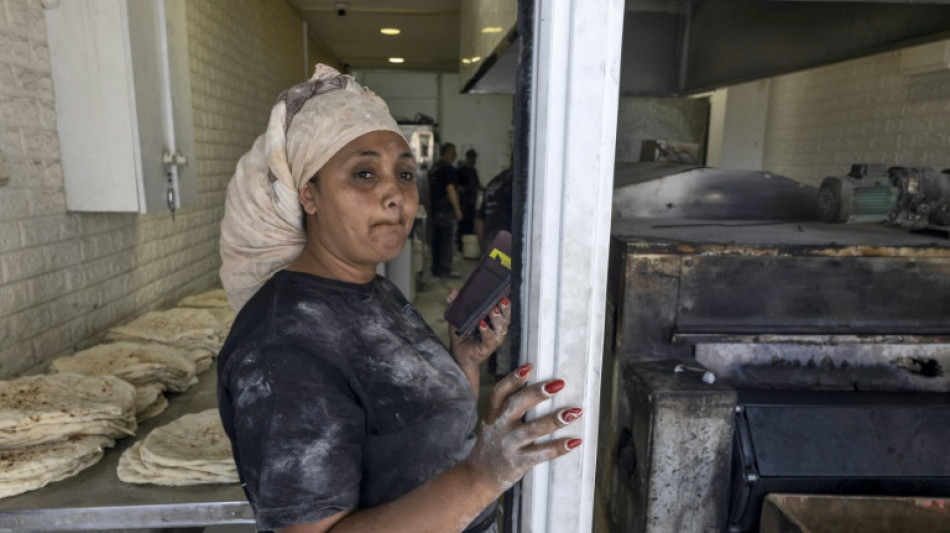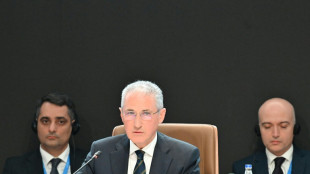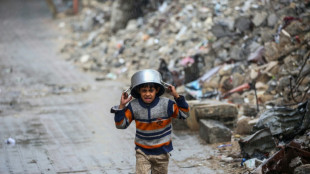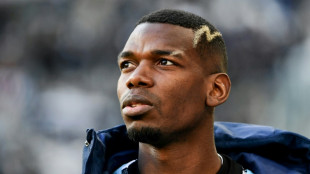
-
 4 security forces killed as ex-PM Khan supporters flood Pakistan capital
4 security forces killed as ex-PM Khan supporters flood Pakistan capital
-
Four bodies, four survivors recovered from Egypt Red Sea sinking: governor

-
 Ayub century helps Pakistan crush Zimbabwe, level series
Ayub century helps Pakistan crush Zimbabwe, level series
-
French court cracks down on Corsican language use in local assembly

-
 Russia expels UK diplomat accused of espionage
Russia expels UK diplomat accused of espionage
-
Israeli security cabinet to discuss ceasefire as US says deal 'close'

-
 COP29 president blames rich countries for 'imperfect' deal
COP29 president blames rich countries for 'imperfect' deal
-
No regrets: Merkel looks back at refugee crisis, Russia ties

-
 IPL history-maker, 13, who 'came on Earth to play cricket'
IPL history-maker, 13, who 'came on Earth to play cricket'
-
Prosecutors seek up to 12-year terms for French rape trial defendants

-
 Laos hostel staff detained after backpackers' deaths
Laos hostel staff detained after backpackers' deaths
-
Hong Kong LGBTQ advocate wins posthumous legal victory

-
 Rod Stewart to play Glastonbury legends slot
Rod Stewart to play Glastonbury legends slot
-
Winter rains pile misery on war-torn Gaza's displaced

-
 'Taiwan also has baseball': jubilant fans celebrate historic win
'Taiwan also has baseball': jubilant fans celebrate historic win
-
Russia pummels Ukraine with 'record' drone barrage

-
 Paul Pogba blackmail trial set to open in Paris
Paul Pogba blackmail trial set to open in Paris
-
Landmine victims gather to protest US decision to supply Ukraine

-
 Indian rival royal factions clash outside palace
Indian rival royal factions clash outside palace
-
Manga adaptation 'Drops of God' nets International Emmy Award

-
 Philippine VP denies assassination plot against Marcos
Philippine VP denies assassination plot against Marcos
-
Hong Kong's legal battles over LGBTQ rights: key dates

-
 US lawmakers warn Hong Kong becoming financial crime hub
US lawmakers warn Hong Kong becoming financial crime hub
-
Compressed natural gas vehicles gain slow momentum in Nigeria

-
 As Arctic climate warms, even Santa runs short of snow
As Arctic climate warms, even Santa runs short of snow
-
Plastic pollution talks: the key sticking points

-
 Indonesia rejects Apple's $100 million investment offer
Indonesia rejects Apple's $100 million investment offer
-
Pakistan police fire tear gas, rubber bullets at pro-Khan supporters

-
 Hong Kong same-sex couples win housing, inheritance rights
Hong Kong same-sex couples win housing, inheritance rights
-
Indonesia digs out as flooding, landslide death toll hits 20

-
 Liverpool's old guard thriving despite uncertain futures
Liverpool's old guard thriving despite uncertain futures
-
Mbappe takes reins for Real Madrid in Liverpool clash

-
 As AI gets real, slow and steady wins the race
As AI gets real, slow and steady wins the race
-
China's Huawei to launch 'milestone' smartphone with homegrown OS

-
 Porzingis and Morant make triumphant NBA returns
Porzingis and Morant make triumphant NBA returns
-
Hong Kong top court affirms housing, inheritance rights for same-sex couples

-
 Philippines, China clashes trigger money-making disinformation
Philippines, China clashes trigger money-making disinformation
-
Most Asian markets drop, dollar gains as Trump fires tariff warning

-
 England 'not quivering' ahead of New Zealand Test challenge
England 'not quivering' ahead of New Zealand Test challenge
-
Bethell to bat at three on England Test debut against New Zealand

-
 Trump vows big tariffs on Mexico, Canada and China
Trump vows big tariffs on Mexico, Canada and China
-
New Zealand and England to play for Crowe-Thorpe Trophy

-
 Scheffler, Schauffele and McIlroy up for PGA Player of the Year
Scheffler, Schauffele and McIlroy up for PGA Player of the Year
-
Trump to face less internal pushback in new term: ex-commerce chief

-
 Extreme weather threatens Canada's hydropower future
Extreme weather threatens Canada's hydropower future
-
More than 34,000 register as candidates for Mexico judges' election

-
 Australia ban cycling's Richardson for life after UK defection
Australia ban cycling's Richardson for life after UK defection
-
Internal displacement in Africa triples in 15 years: monitor

-
 'Remarkable global progress': HIV cases and deaths declining
'Remarkable global progress': HIV cases and deaths declining
-
Social media firms raise 'serious concerns' over Australian U-16 ban


At 75, Israel's economy offers success or inequality
Now 75 years old, Israel models itself as an economic success story, a leader in business, agriculture and advanced technologies -- despite glaring inequalities that have left many Israelis behind.
The country readily describes itself as a "start-up nation", and its per capita GDP is higher than that of Germany, France or Britain.
But "there is the start-up nation and the soup kitchen nation," says Gilles Darmon, the head of Latet, an Israeli non-profit group working to fight poverty and deliver food aid.
According to Darmon, almost 10 percent of families among Israel's population of 9.7 million face "severe" food insecurity.
The economy offers two opposing images, he said, one side centred on Tel Aviv's hi-tech industries "where in terms of prosperity you have to be in the richest cities in the world... and on the other side more than 312,000 families are in a situation of severe food insecurity".
To highlight its commercial successes, Israel, a nation born on May 14, 1948, can point to enviable economic performances.
Growth was 6.5 percent in 2022, down from 8.6 percent in 2021 but well above the OECD average of 2.8 percent, and the budget deficit largely contained.
Israel's cyber security work has made the sector one of the economy's driving forces, with companies such as Check Point establishing themselves as global leaders in IT security.
- 'Commando spirit' -
The eastern Mediterranean country is also at the forefront of innovation in biotechnology and agriculture, with firms such as Netafim, which first developed irrigation technology in the Negev desert in the 1960s and grew to supply agribusiness worldwide.
The weapons industry remains an important component of the economy, with Elbit Systems, Israel Aerospace Industries and Rafael Advanced Defense Systems competing for lucrative international arms contracts.
Israeli expertise is also found globally in many hi-tech corporations, said Daniel Rouach, president of the Israel France Chamber of Commerce.
"There is Israeli know-how in the components that are found in large multinationals like Intel or Google," he said.
Waze, a much-used car navigation application, was an Israeli enterprise before Google acquired it.
Rouach said these successes stem from Israel's entrepreneurial mentality, "a commando spirit which consists of maximum use of allocated budgets in minimum time with sometimes enormous risk-taking, the only parameter being the goal to reach".
But on the margins of this success, which is visibly represented by sprawling housing estates of opulent villas in central Israel, the reality is less flashy.
In Shimshon, a suburb of the coastal city of Ashkelon, stand long rows of decrepit concrete buildings.
Hastily built in the late 1950s to accommodate massive immigration, mostly from North Africa, they are now largely occupied by Ethiopian and Russian migrants, without having seen significant renovation.
- Food or medicine -
Yellow facades are strewn with drying clothes hanging from small balconies black with grime, and paper litters back yards.
"We are all in trouble. The whole neighbourhood! We are barely surviving on public assistance benefits," said 73-year-old retiree Esther Benhamou, as she painfully climbed the steps to her apartment.
"I have to choose: eat or buy my medicine," she added, once inside her sparsely furnished living room.
More than 27 percent of Israel's population lives in poverty, according to figures published by Latet at the end of 2022.
And Israel has the third highest poverty rate in the OECD, behind Bulgaria and Costa Rica.
"In just over 30 years, we have gone from one of the most egalitarian societies in the world... to a highly unequal and individualistic society", Darmon said.
"The state has ceased to ensure its role, to mitigate the effects of the market and to redistribute wealth."
Many charitable organisations are working to meet the needs of the poorest. In Kyriat Malakhi, a small town in southern Israel, Nikol Jibril, 72, has provided meals to those in need for 30 years.
One of a dozen volunteers in a kitchen, she said the poverty "situation is only getting worse".
"As soon as you help a family get out of it, another one arrives," she said. "It never stops, there are always more who are sent to us."
A.S.Diogo--PC


